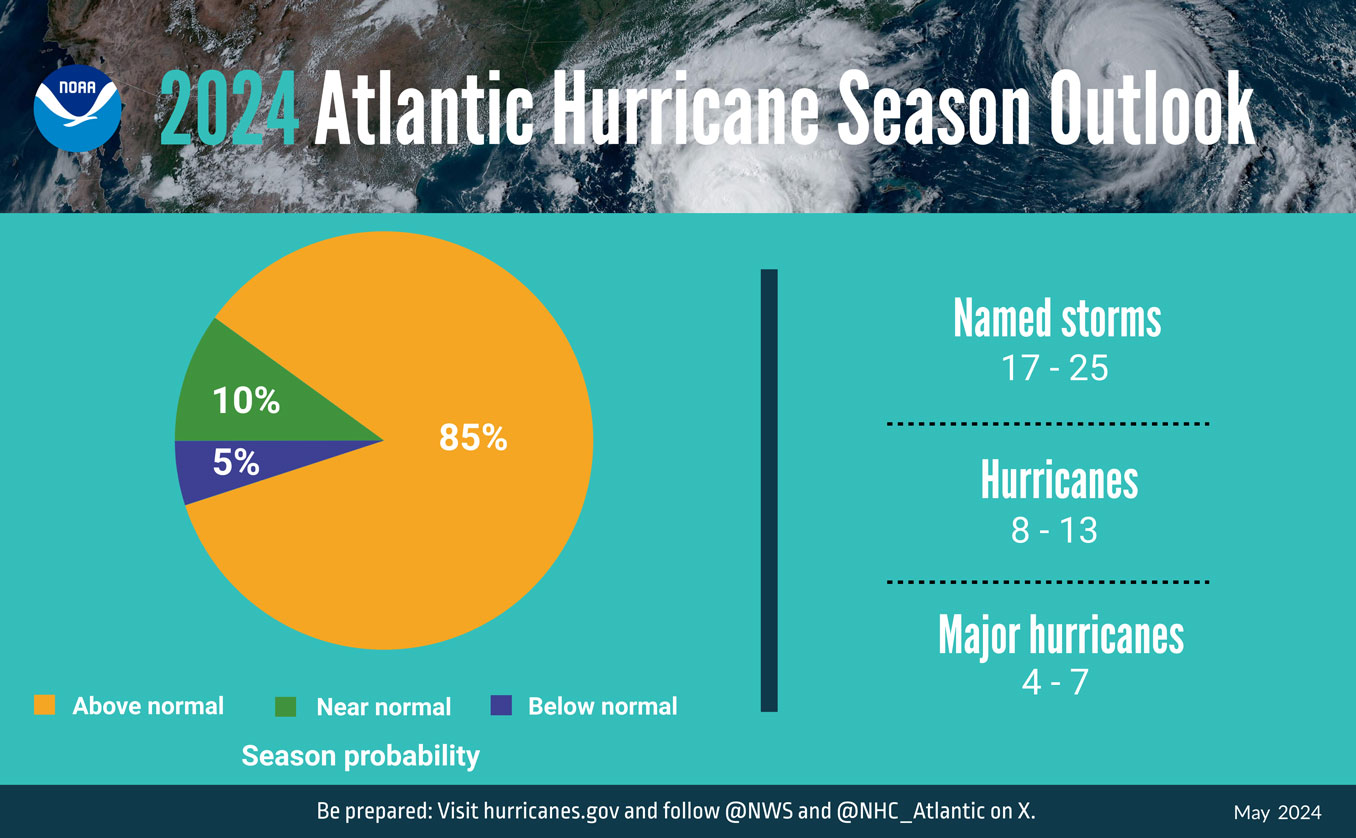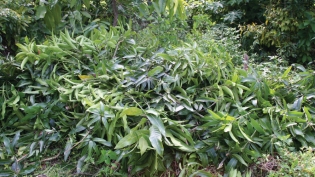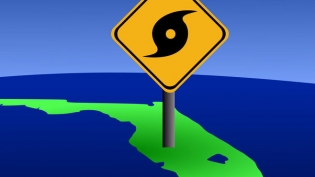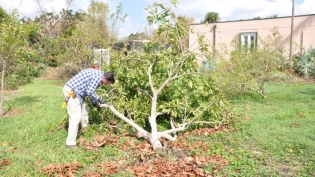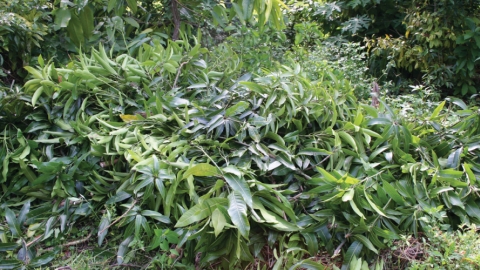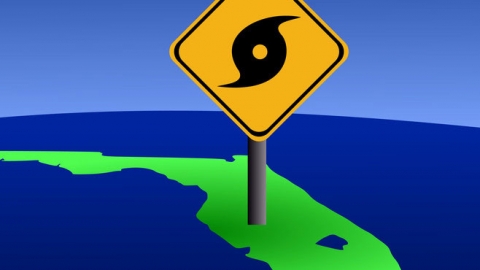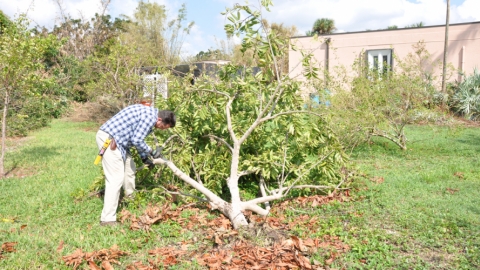Your All-in-One Guide to Hurricane Season 2024
Hurricane Milton is forecast to make landfall in central west Florida just weeks after Hurricane Helene wreaked destruction on the Gulf coast. Right now, the forecast calls for rain, winds and street flooding to South Florida. Monitor the National Hurricane Center for regular updates.
Many municipalities are providiing residents with sandbags. Follow your city and county websites. We'll post closings and other information on our Instagram and Facebook accounts.
Avoid those last-minute grocery store runs for the last cans of leche condensada and batteries. Hurricane season starts June 1 and lasts through Nov. 30.
Here’s a comprehensive guide to help you get ready:
Food and Farm Resources
Fresh Access Bucks has put together a list of resources specifically for Florida farmers, markets and consumers.
Florida Organic Farmers Resources for Farmers
This organization has put together information aimed at farmers affected by hurricanes:
1. Document all damages: Take photos and videos of damage.
2. Report to USDA: Contact your local USDA Service Center to request assistance.
3. Keep detailed records: Write down all damage descriptions, necessary repairs, and expenses, and save receipts for potential reimbursements.
4. Hold off on permanent repairs: Emergency repairs like gates and fencing can be made, but permanent fixes require FSA authorization.
USDA Support for Farmers Affected by Hurricanes Helene and Milton
The USDA provides a variety of programs to support farmers recovering from natural disasters, including ememgency assistance for livestock, honeybees and farm-raised ifsh, noninsured crop disaster assistance, tree assistance, abd emergency relief. For more details, visit the USDA’s Hurricane Recovery Resource Page: Hurricane Preparation and Recovery Resources
Prune Your Trees
Why: Properly pruned trees are less likely to be uprooted or lose branches during a hurricane, reducing damage to your home and property.
How: Hire a professional arborist to trim large trees. Remove dead or weak branches and thin the canopy to allow wind to pass through more easily.
When: Now – well before the storm.
Tropical Fruit Tree Hurricane Info
The UF/IFAS Disaster Preparation and Recovery Website offers vital information to help Floridians prepare for and recover from a variety of natural disasters, including hurricanes and flooding. Here you will find tips, guidelines, videos, and useful contacts.
Ready.gov is a product of the United States Department of Homeland Security and provides many valuable resources in the form of videos, graphics and toolkits designed to help you plan ahead for many types of disasters, including hurricanes and tropical storms. Now would be a good time to review their guidelines for sheltering, four-step guide to making a plan and other resources available throughout the website.
UF/IFAS also has more publications on tree crops and hurricanes for homeowners and commercial growers.
There is also a Tropical Fruit Tuesday webinar on before and after hurricanes.
The Hurricane Readiness Guide includes all three official Miami-Dade County languages (English, Spanish and Haitian Creole). The Hurricane Guide is available digitally via the Miami-Dade County webpage and on the ReadyMDC app for Android and iPhone devices.
Stock Nonperishable Food and Water
Food: Stock up on canned goods, dried fruits, nuts, peanut butter and protein bars. Choose items that don’t require refrigeration or cooking.
Water: Store at least one gallon of water per person per day for at least three days. Don’t forget water for pets. Save tap water in recycled milk and juice jugs.
Extra Tips: Look for foods with a long shelf life that require minimal preparation, like dehydrated seasonal tropical fruits – mango and pineapple, for example.
Pet Care: Dogs and Cats
ID Tags: Ensure pets have up-to-date ID tags and microchip information.
Supplies: Prepare a pet emergency kit with food, water, medications, a leash, a carrier and comfort items.
Shelter: Research pet-friendly shelters in your area and have a plan for where to take your pets if you need to evacuate.
Fill Your Car with Gas
When: Fill your car’s gas tank as soon as a hurricane watch is issued. Don’t wait until the last minute. Gas stations can run out of fuel quickly.
Why: A full tank ensures you can evacuate if necessary and avoid long lines at gas stations.
Essential Supplies: Batteries and More
Batteries: Stock up on batteries for flashlights, radios and other essential devices.
Other Supplies: Purchase a portable phone charger, a manual can opener, a first aid kit, candles, matches, and a battery-operated or hand-crank radio.
Tax-Free Periods: Florida offers sales tax holidays for hurricane supplies. During the 2024 Florida Disaster Preparedness Sales Tax Holiday, you can buy qualifying
items related to disaster preparedness exempt from sales tax from Sat., June 1–Fri. June 14, 2024. The second holiday period begins on Sat., Aug. 24–Fri., Sept. 6, 2024.
Items that are exempt from tax during the sales tax holiday include:
• A portable generator used to provide light or communications or preserve food in the event of a power outage with a sales price of $3,000 or less
• A tarp or other flexible waterproof sheeting with a sales price of $100 or less
• A smoke detector or smoke alarm with a sales price of $70 or less
• A fire extinguisher with a sales price of $70 or less
• A carbon monoxide detector with a sales price of $70 or less
• A nonelectric food storage cooler with a sales price of $60 or less
• A portable power bank with a sales price of $60 or less
• A gas or diesel fuel tank with a sales price of $50 or less
• A portable self-powered radio*, two-way radio, or weather-band radio with a sales price of $50 or less
• A package of AA-cell, AAA-cell, C-cell, D-cell, 6-volt, or 9-volt batteries, excluding automobile and boat batteries, with a sales price of $50 or less
• A portable self-powered light source* (powered by battery, solar, hand-crank, or gas) with a sales price of $40 or less
• Flashlights
• Lanterns
• Candles
• Reusable ice (ice packs) with a sales price of $20 or less
Supplies necessary for the evacuation of household pets. For purposes of this exemption, necessary supplies means the noncommercial purchase of:
• Bags of dry cat or dog food weighing 50 or fewer pounds and with a sales price of $100 or less per bag
• Portable kennels or pet carriers with a sales price of $100 or less per item
• Over-the-counter pet medications with a sales price of $100 or less
• Pet beds with a sales price of $40 or less per item
• Cat litter weighing 25 or fewer pounds and with a sales price of $25 or less per item
• Leashes, collars, and muzzles with a sales price of $20 or less per item
• Pet pads with a sales price of $20 or less per box or package
• Manual can openers with a sales price of $15 or less per item
• Collapsible or travel-sized food bowls or water bowls with a sales price of $15 or less per item
• Cat litter pans with a sales price of $15 or less per item
• Pet waste disposal bags with a sales price of $15 or less per package
• Hamster or rabbit substrate with a sales price of $15 or less per package
• Cans or pouches of wet dog food or cat food with a sales price of $10 or less per can or pouch or the equivalent if sold in a box or case
Evacuation Shelters
For residents living on the beach and in the Florida Keys who must evacuate when a hurricane approaches should identify the nearest evacuation shelters before the hurricane season begins. Miami-Dade, Broward and Monroe counties have designated shelters, some of which are pet-friendly. Shelters can fill up quickly, so it’s advisable to have an alternative plan, such as staying with friends or family inland. Have a go-bag ready with essential items, including medications, important documents, and pet supplies. Check the following resources for shelter information and updates during a storm:
Miami-Dade County Evacuation Shelters
Broward County Evacuation Shelters
Monroe County (Florida Keys) Evacuation Shelters
Plan your evacuation route in advance and ensure your vehicle is ready to go when an evacuation order is given.
More Resources
Florida Division of Emergency Management
Miami-Dade County Emergency Management
Broward County Emergency Management
Monroe County Emergency Management
National Hurricane Center


